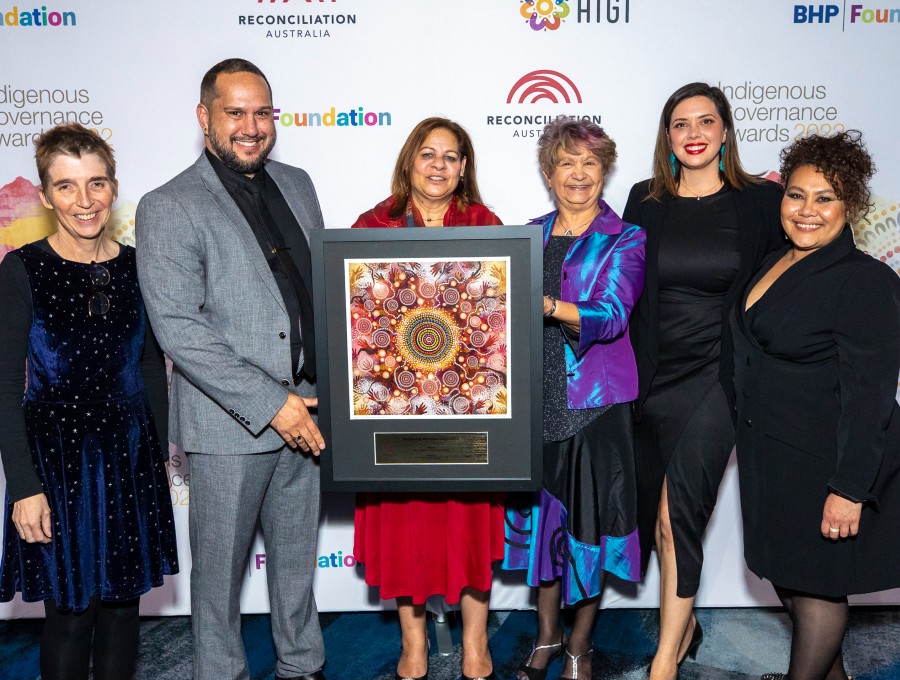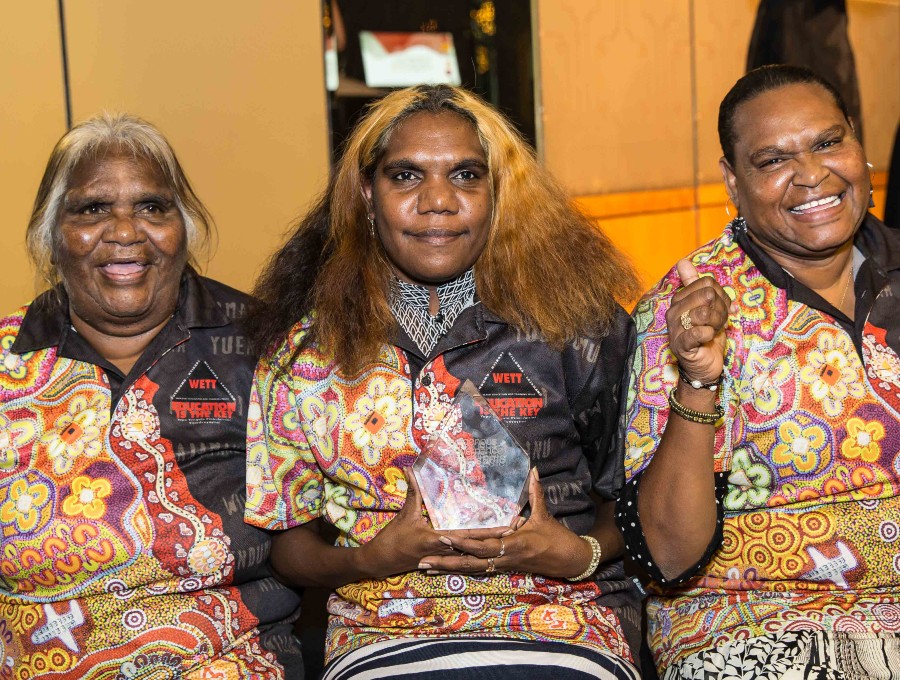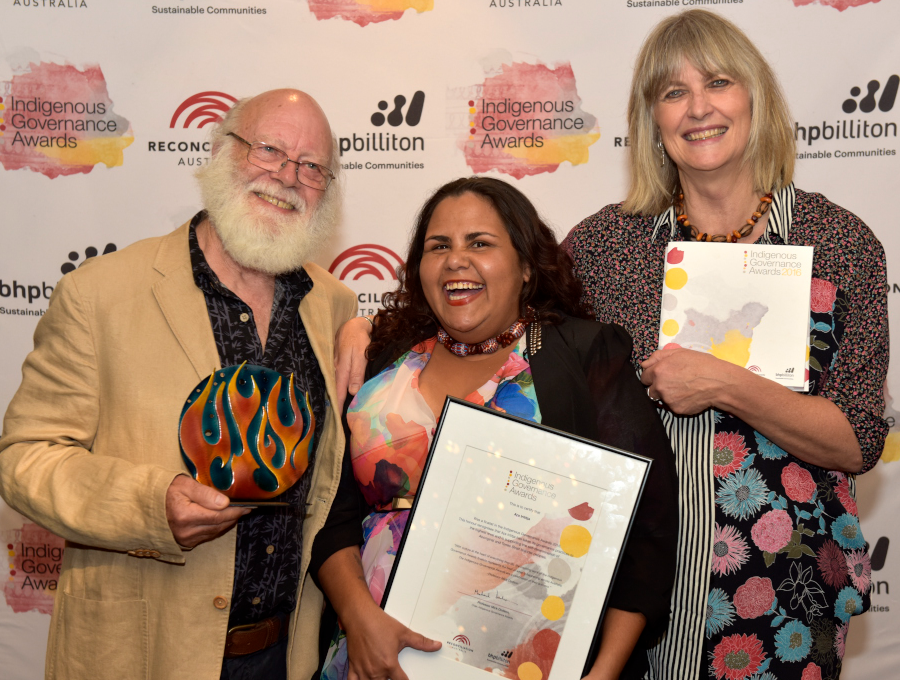Winner: Category A
Waltja Tjutangku Palyapayi Aboriginal Corporation
Waltja Tjutangku Palyapayi Aboriginal Corporation is a pioneering initiative of the Central Australian communities’ strong women leaders. It supports communities over a 90,000 km² area to address economic disadvantage and ensure local voices are heard. It provides key services to help the community grow, including training and employment opportunities and projects to maintain family and culture and encourage greater economic independence. Waltja’s social enterprise investments make a real difference to people’s lives, and address needs often overlooked by government funding programs, including disability support care, emergency relief and a ‘culture car’ that can be hired by families to attend significant cultural events. Waltja highlights the important influence and leadership women have in communities, and works hard to improve outcomes for families in some of the most remote areas of Australia.
Winner: Category B
The Marruk Project
The Marruk Project takes a unique and exciting approach to connecting all members of its local community in the regional Victorian town of Swan Hill. It uses performing arts to strengthen culture and create opportunities for elders, young people, artists and cultural leaders to get to know each other by sharing their histories. Through acting, puppetry, dance, live music and video, the project not only raises cross-cultural awareness but develops the skills of participating performers. The group started with Aboriginal performers and now involves non-Indigenous people from the Swan Hill community, including Afghan and Sudanese refugees. Marruk connects people to culture through creative productions, empowers individuals and keeps age-old dreaming stories alive.
Finalists: Category A
Girringun Aboriginal Corporation
Highly Commended
Girringun Aboriginal Corporation cares for over one million hectares of land and sea on behalf of nine Traditional Owner groups in North Queensland. Girringun’s trailblazing success is driven by the Elder’s desire to keep country, people and culture strong. Their work involves a well-established arts centre, ranger program, native plant nursery and Traditional Use of Marine Resources Agreement (TUMBRA) program. Girringun is widely recognised for its outstanding stewardship of the land and sea rights of its members and its tireless negotiation of Australia’s first co-managed Indigenous Protected Area. They are a well-respected leader in the community and ensure everyone has an opportunity to participate in key decisions affecting their collective future. Girringun’s excellent reputation was recognised when a freehold landowner granted a conservation area to the organisation to be cared for by Traditional Owners
Institute for Urban Indigenous Health
The Brisbane-based Institute for Urban Indigenous Health (IUIH) is striving to close the life expectancy gap between Indigenous and non-Indigenous people in South East Queensland through a regional, evidence-based approach. Only in its fifth year of operation, the Institute is achieving significant results. Last year, their services attracted 6,000 new patients, preventative health checks increased by an incredible 1,300 per cent and their key programs Work it Out and Deadly Choices enabled Aboriginal and Torres Strait Islander people to make healthy lifestyle choices. The Institute’s unique governance model has brought together four independent Aboriginal Health Services to empower communities. The Institute uses data and evidence to target the delivery of health services to the specific needs of Aboriginal and Torres Strait Islander people living in South East Queensland. This approach is rapidly showing an improvement to the health and wellbeing of Aboriginal and Torres Strait Islander peoples in the area
Ngnowar Aerwah Aboriginal Corporation
For almost three decades, Ngnowar Aerwah Aboriginal Corporation has delivered crucial drug and alcohol services to the community in Western Australia’s remote east Kimberley region. The organisation is working to strengthen cultural and family ties amongst its clients and community and provides everything from mental health and cultural workshops to music appreciation and pregnancy classes. Growing from a small tin-shed to a pillar of the community, Ngnowar Aerwah serves thousands of people and has helped to achieve a 35 per cent decrease in domestic violence in the community. Ngnowar Aerwah is supporting its community to thrive—delivering crucial services, employing passionate people and contributing to the wellbeing of the community
Victorian Aboriginal Child Care Agency
The Victorian Aboriginal Child Care Agency (VACCA) is the oldest Aboriginal child and family welfare organisation in Victoria—and for 38 years has protected and promoted the rights of Aboriginal children, young people, families and communities. The organisation provides crucial services to reinforce Aboriginal culture, encourage best parenting practices and advise government. VACCA has a long history of achievements for the Victorian Aboriginal community. It successfully lobbied for changes to Victoria’s child protection laws and for the inclusion of special provisions based on the right of Aboriginal people to self-determination and self-management in the state’s family law. VACCA is strengthening the safety, wellbeing and cultural connectedness of Aboriginal children, young people, families and communities
Finalist: Category B
Muntjiltjarra Wurrgumu Group
Highly Commended
Led and developed by Martu people under the Wiluna Regional Partnership Agreement, the Muntjiltjarra Wurrgumu Group has established itself as an important voice at the decision making table. It is helping to break down communication barriers between the local Aboriginal community, industry and government agencies. Driver licensing, a lack of personal identification cards, schooling, racism and employment opportunities are some of the issues the group tackles on a regular basis. In 2013, the group designed and delivered a unique baseline survey to understand what local community members thought so they could share their story with government and industry. The survey’s results are now driving the group’s work and spurred Rosslyn Hill Mining to run its own pilot project to provide future employment opportunities in the mine for the local community. Muntjiltjarra Wurrgumu Group has been designed, created and delivered with complete ownership of local Aboriginal people, giving local people greater control over how external agencies and industry work with the community.
More awards
Take a look at the winners and finalists from other years:
The Indigenous Governance Awards 2020 were postponed to 2022 due to the pandemic.






